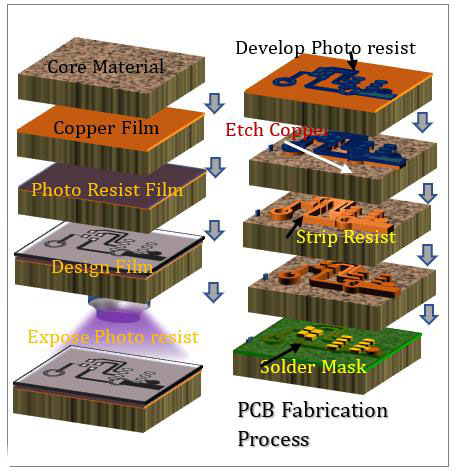PCB board substrate design principles
1. In the substrate, the pad of the DIE must be in the same direction as the bonding wire, and the lead wire must also be in the same direction as the pad. For each DIE, a cross-shaped pad must be placed on its diagonal. As the alignment coordinates when binding, the coordinates need to be connected to the network of the attachment. Generally, the location is selected (the network must be present, otherwise the cross will not appear), and in order to prevent the cross from being submerged by the copper skin, the accurate positioning is generally used. It is forbidden to lay copper plates to surround it. For the binding of DIE, note that the unused pads, that is, the pads that are not connected to the network, need to be deleted.

2. The production process of the substrate is special. Each line must be made of electroplated lines to pour copper material to form pads and traces, or all other places where copper is needed. It must be noted here that even if there is no electrical connection, that is, no network, the pad must be pulled out of the board frame to plate the pad with copper in the eco mode, otherwise the pad will be copper-free. And the electroplated wire drawn out of the board frame must have a corrosion position marked on the other layer of copper, here is marked with seven layers of copper. Generally speaking, the copper skin is 0.15mm beyond the inner side of the board frame, and the distance between the copper edge and the board frame is about 0.2mm.
3. In the board frame, it is necessary to determine the positive and negative sides, so that all components are placed on the same side, and the side is marked with three XXX, as shown in the figure below.
4. The pad used on the substrate is larger than the general pad and has a special package, which is CX0201. The X mark is different from C0201. Organized as follows:
0603 pad: 1.02mmX0.92mm pad window area: 0.9mmX0.8mm, the distance between the two pads is 1.5mm.
0402 pad: 0.62mmX0.62mm pad window area: 0.5mmX0.5mm, the distance between the two pads is 1.0mm.
0201 pad: 0.42mmX0.42mm pad window area: 0.3mmX0.3mm, the distance between the two pads is 0.55mm.
5. The requirements of DIE are as follows: Bonding pad (single wire) has a small size of 0.2mmX0.09mm and 90 degrees, the spacing of each pad is as small as 2MILS, and the pad width of the inner row of ground and power lines is also required to be 0.2 mm. The angle of the bonding pad should be adjusted according to the angle of the component pulling wire. When making the substrate, the binding wire is not easy to be too long. The small distance between the main control DIE and the inner bonding pad is 0.4mm, and the distance between the FLASHDIE and the bonding pad is 0.2mm. The length of the two binding wires should not exceed 3mm. The spacing between the two rows of bonding pads should be more than 0.27mm apart.
6. The distance between the smt pad and the DIE bonding pad and the smt component must be kept above 0.3mm, and the distance between the bonding pad of one DIE and the other DIE must also be kept above 0.2mm. The signal trace is as small as 2MILS, and the spacing is 2MILS. The main power line should be 6-8MILS, and the ground should be as large as possible. Where it is not possible to lay the ground, power and other signal lines can be laid to enhance the strength of the substrate.
7. When wiring, pay attention to vias and pads, traces, and gold fingers should not be too close. Vias and gold fingers of the same attribute should also be kept at least 0.12mm, and vias with different attributes should be kept away from the pad and gold as much as possible. finger. The via hole is as small as the outer hole is 0.35mm and the inner hole is 0.2mm. When laying copper, pay attention to the copper and gold fingers not to be very close, some of the broken copper should be deleted, and it is not allowed to have a large area that is not covered. Where copper exists.
8. Use grids when paving copper. The ratio is 1:4, which means that the copper pour angle of COPPERPOUR is 0.1mm and COPPER is 0.4mm instead of 45 degrees.
The above is the introduction of PCB substrate design principles. Ipcb also provides PCB manufacturers and PCB manufacturing technology.